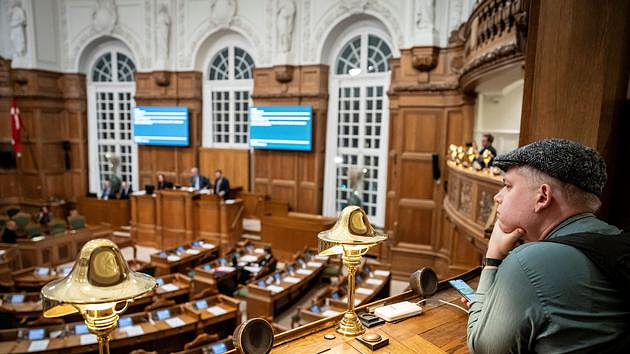Copenhagen
On Thursday, the Folketing, the Danish unicameral Parliament, was full. All the deputies, even those suffering from Covid, were present to vote on one of the most controversial laws in the country's history, commonly called “Koranloven”. At the end of an intense debate, during which the government remained strangely silent, the parties of the ruling coalition (social democrats, liberals and centrists) and the radicals (in opposition) voted by a large margin. majority (94 to 77) the bill "prohibiting the inappropriate treatment of objects of significant religious significance" for state-recognized religious communities.
This controversial text has been revised since its first version in August, considered extreme to respond to massive criticism from opposition parties, the media and experts, accusing the government of giving in in the face of Islamist threats. “It is above all about the security of the Danes,” admitted the Social Democratic Minister of Justice, Peter Hummelgaard, defending this “necessary law”, after the series of burnings of the Koran since the start of the year, which provoked demonstrations in several Muslim countries and an outcry from the Organization of the Islamic Conference (OIC).
“We must put an end,” he pleaded, “to this type of provocation which has the sole aim of causing negative consequences, such as that observed in October 2023 during this tragic event in Brussels where two Swedes were killed” by a Tunisian, protesting against the burning of the Koran in Sweden. “The terrorist threat must be taken seriously,” he says. This is why the government is taking action against these systematic insults to the holy books which aim only to sow discord and which have consequences for the security of Denmark and the Danes.” 528 protests around religious books or flag burning were reported between July 21 and November 28 in Denmark, according to police.
Listening to criticism, the government made adjustments to the initial text. Thus, artistic creations featuring religious symbols will be exempt from prosecution, as will “verbal and written” blasphemy, including caricatures. Without convincing the nine opposition parties (right and left) who denounce this complete attack on freedom of expression, a pillar of Danish democracy, severely tested during the Mohammed caricature crisis in 2005 -2006.
Still skeptical, the president of the Danish Democrats (populist), Inger Stojberg, insists that it is “wrong to limit freedoms in a modern and enlightened society”. “We place the Koran above the Constitution,” she is indignant, noting that “we will henceforth be the only Nordic country which has bowed to the mullahs, to protests and to pressure in the Middle East” .
The population is equally divided on the law, with 51% of respondents in favor of it, according to a Megafon poll, while 39% are opposed. At the same time, a very large majority (84%) of respondents strongly support freedom of expression. For their part, lawyers and experts have expressed their concerns about this law which will allow more limitations on freedom of expression, as soon as pressure is exerted from Middle Eastern countries.
In a column published on November 9 in the daily Information, Jakob Holtermann, lecturer at the University of Copenhagen, wonders "whether Denmark can become a safer country in the long term by giving in to Islamist threats." the demands of the Organization of the Islamic Conference (to put an end to the burning of the Koran, Editor's note), we are increasing its possibility of putting pressure on Sweden (...) which finds itself in a much more exposed security situation than Denmark », he observes.
Also read: “By banning the burning of the Koran, Denmark reestablishes the “crime of sacrilege””
Indeed, the Swedish neighbor, in the crosshairs of the Islamists after the numerous burnings of the Koran, did not go that far, refusing to follow the Danish path. Sweden has “proved,” notes the jurist, “that it is possible for a small state to defy the veto of the caliphate (OCI) and maintain the broadest possible freedom of expression, including the right to the ultimate blasphemous insult ".

 B:SM will break its investment record this year with 62 million euros
B:SM will break its investment record this year with 62 million euros War in Ukraine: when kyiv attacks Russia with inflatable balloons loaded with explosives
War in Ukraine: when kyiv attacks Russia with inflatable balloons loaded with explosives United States: divided on the question of presidential immunity, the Supreme Court offers respite to Trump
United States: divided on the question of presidential immunity, the Supreme Court offers respite to Trump Maurizio Molinari: “the Scurati affair, a European injury”
Maurizio Molinari: “the Scurati affair, a European injury” Irritable bowel syndrome: the effectiveness of low-carbohydrate diets is confirmed
Irritable bowel syndrome: the effectiveness of low-carbohydrate diets is confirmed Beware of the three main sources of poisoning in children
Beware of the three main sources of poisoning in children First three cases of “native” cholera confirmed in Mayotte
First three cases of “native” cholera confirmed in Mayotte Meningitis: compulsory vaccination for babies will be extended in 2025
Meningitis: compulsory vaccination for babies will be extended in 2025 When traveling abroad, money is a source of stress for seven out of ten French people
When traveling abroad, money is a source of stress for seven out of ten French people Elon Musk arrives in China to negotiate data transfer and deployment of Tesla autopilot
Elon Musk arrives in China to negotiate data transfer and deployment of Tesla autopilot Patrick Pouyanné, CEO of TotalEnergies, is very reserved about the rapid growth of green hydrogen
Patrick Pouyanné, CEO of TotalEnergies, is very reserved about the rapid growth of green hydrogen In the United States, a Boeing 767 loses its emergency slide shortly after takeoff
In the United States, a Boeing 767 loses its emergency slide shortly after takeoff Paris Globe, a new international theater festival
Paris Globe, a new international theater festival A metal band arrested in the middle of a concert for “Nazi symbolism” in Russia
A metal band arrested in the middle of a concert for “Nazi symbolism” in Russia “You make your loved ones suffer”: Andréa Bescond castigates Kendji Girac
“You make your loved ones suffer”: Andréa Bescond castigates Kendji Girac Barbie, The Crown and Love Actually memorabilia up for auction to benefit war-affected children
Barbie, The Crown and Love Actually memorabilia up for auction to benefit war-affected children Skoda Kodiaq 2024: a 'beast' plug-in hybrid SUV
Skoda Kodiaq 2024: a 'beast' plug-in hybrid SUV Tesla launches a new Model Y with 600 km of autonomy at a "more accessible price"
Tesla launches a new Model Y with 600 km of autonomy at a "more accessible price" The 10 best-selling cars in March 2024 in Spain: sales fall due to Easter
The 10 best-selling cars in March 2024 in Spain: sales fall due to Easter A private jet company buys more than 100 flying cars
A private jet company buys more than 100 flying cars This is how housing prices have changed in Spain in the last decade
This is how housing prices have changed in Spain in the last decade The home mortgage firm drops 10% in January and interest soars to 3.46%
The home mortgage firm drops 10% in January and interest soars to 3.46% The jewel of the Rocío de Nagüeles urbanization: a dream villa in Marbella
The jewel of the Rocío de Nagüeles urbanization: a dream villa in Marbella Rental prices grow by 7.3% in February: where does it go up and where does it go down?
Rental prices grow by 7.3% in February: where does it go up and where does it go down? Even on a mission for NATO, the Charles-de-Gaulle remains under French control, Lecornu responds to Mélenchon
Even on a mission for NATO, the Charles-de-Gaulle remains under French control, Lecornu responds to Mélenchon “Deadly Europe”, “economic decline”, immigration… What to remember from Emmanuel Macron’s speech at the Sorbonne
“Deadly Europe”, “economic decline”, immigration… What to remember from Emmanuel Macron’s speech at the Sorbonne Sale of Biogaran: The Republicans write to Emmanuel Macron
Sale of Biogaran: The Republicans write to Emmanuel Macron Europeans: “All those who claim that we don’t need Europe are liars”, criticizes Bayrou
Europeans: “All those who claim that we don’t need Europe are liars”, criticizes Bayrou These French cities that will boycott the World Cup in Qatar
These French cities that will boycott the World Cup in Qatar PSG: “Immense pride in continuing the adventure in Paris”, relishes Zaire-Emery
PSG: “Immense pride in continuing the adventure in Paris”, relishes Zaire-Emery Breaking: everything you need to know about this sport
Breaking: everything you need to know about this sport NBA: Lakers gain respite, Boston responds to Miami
NBA: Lakers gain respite, Boston responds to Miami Top 14: “a very severe red card”, estimates Labit (French Stadium)
Top 14: “a very severe red card”, estimates Labit (French Stadium)

















